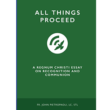 The word “Communion” can mean so many different things in the Church: we have the Communion rite at Mass, we call the Eucharist “Communion,” we talk about communion in a group, communion with the Pope, communion with the poor and downtrodden, and communion with God just to name a few of the ways we use this word.
The word “Communion” can mean so many different things in the Church: we have the Communion rite at Mass, we call the Eucharist “Communion,” we talk about communion in a group, communion with the Pope, communion with the poor and downtrodden, and communion with God just to name a few of the ways we use this word.
In his essay “All Things Proceed,” Fr John Pietropaoli attempts to get down to the essence of communion. Instead of giving a quick two-line philosophical definition, he tries to go around the concept and see it from various aspects like one might view a human person from aspects like biology, sociology, and theology. This method reminds me of John Paul II rather than Thomas Aquinas.
The closest he gets to define a community is on page 19, “Communion… is a recognition, a union of being, and active relationship that’s not yet action but is moving us towards action.”
Overall I think this essay is excellent. For the rest of this review, I will highlight the positive and negative points of the essay.
Fr John is smart by focusing first on communion with Jesus, then moving to a relation with others, then towards action, and finally the specific application in Regnum Christi. This shows the communion flows from Jesus, to us, towards action. This is not reflected precisely in the titles but seems to be the general direction he looks at communion in. The start of communion for a Christian is our baptism which in Jesus is God’s grace and brings us into communion with the Church.
Despite the fact I think this is a 5-star essay, I don’t think it is free from errors. I know Fr Pietropaoli personally and he knows more than anybody else I know about literature. This is generally positive in the fact that he finds many great stories to illustrate his points but a few times I think he goes over the head of an average reader. One example is on the first page where he uses the word “polysemous,” which seems outside ordinary vocabulary: I only understood from context, MS Word – where I’m composing this – doesn’t know it, and can easily be replaced by “has many meanings/senses.” However, this takes little away from the essay. An example of how this comes off positively is using Eckhart Tolle’s experience of desperation which resolved by being struck by the wonder of another person’s presence.
Fr John makes reference to a line of Benedict XVI, “Recognizing creates communion, which is union of being with the one recognized.” And he develops this to realize the first stage of communion – whether with God or with our fellow man – is recognition of the other as other, and as a good which we can be and want to be united to. This recognition began in Eden when Adam recognized that there was no reciprocal communion with any of the animals and he sought out another human, Eve, with whom he could have communion.
When talking about the attitude of communion, he gives two characteristics that I think are worth repeating. “First, we experience communion as a growing awareness of the other person as another person.” “And secondly, we need to realize that this awareness – which is really a new vision – shapes our hearts. Since we are persons, this means it gradually shapes our whole being, including our feelings.”
Communion is not just a practical reality but Fr Pietropaoli notes, “communion is where eternity and time meet.” In our communion with God we are united with other Christians both past and future because we are united in eternity even though we are separated in time.
The final point that jumped out at me was the relation between communion and mission. So often we can concern ourselves with focusing on one or the other but like so many things in Catholic theology the question is not either-or but both-and. When we build communion we fulfill the mission of the Church.
